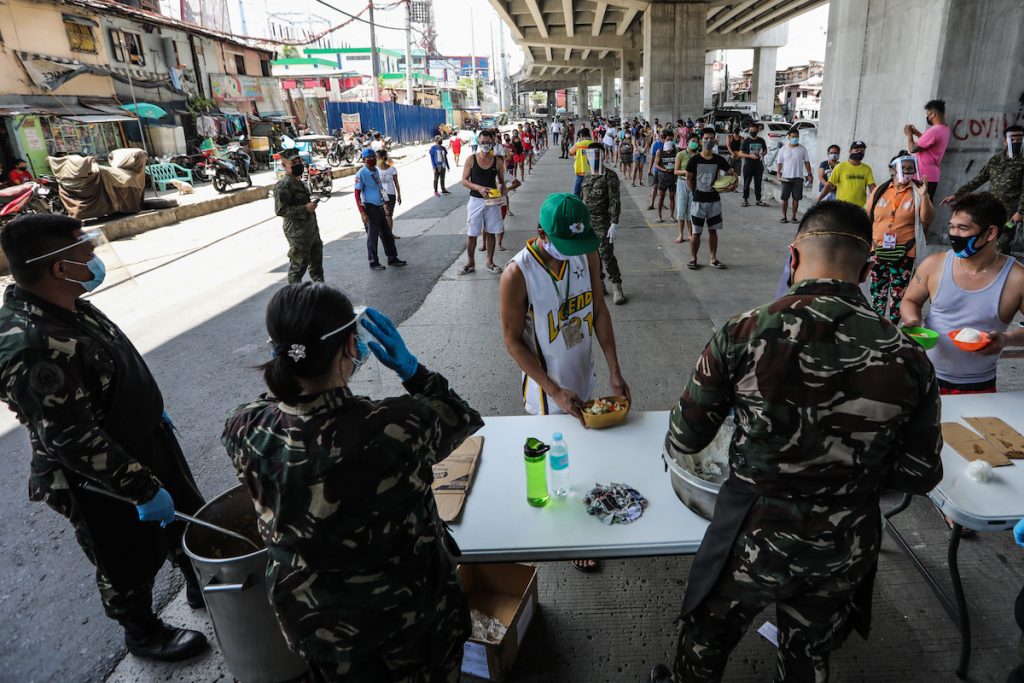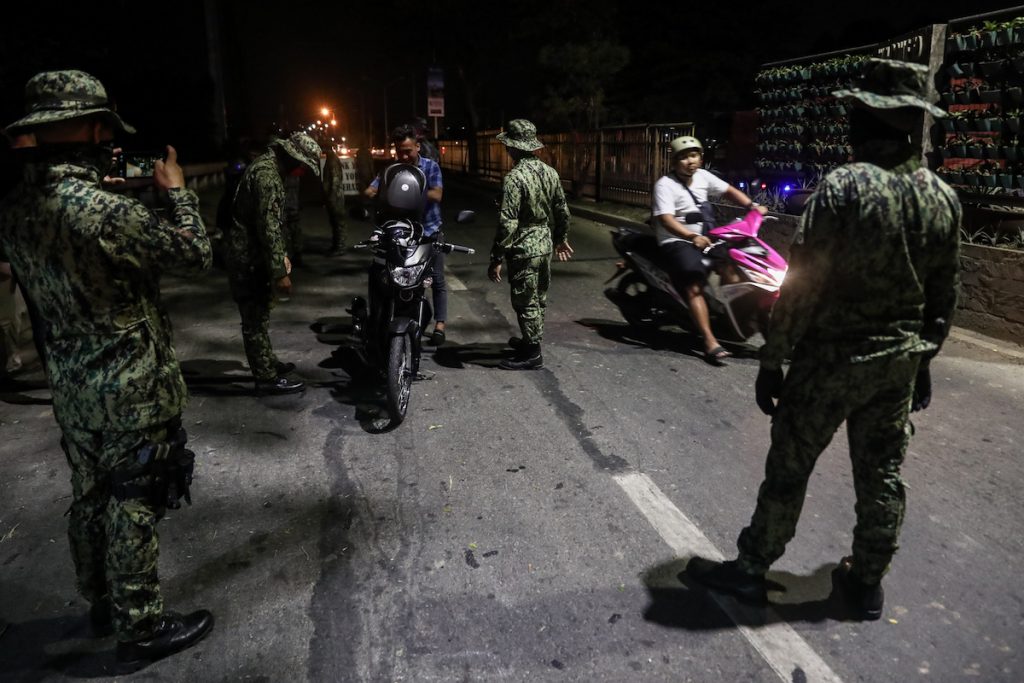Philippine church leaders have reacted to a government plan to impose a “martial law-like” lockdown to prevent people from going out of their homes during the quarantine period.
Bishop Broderick Pabillo, apostolic administrator of the Archdiocese of Manila, called on authorities to review the proposal, saying “martial law is not the answer but food.”
“People will not violate the lockdown if there is food on the table,” said the Manila prelate, adding that basic services, including that distribution of food, have been hardly implemented.
Last week, President Rodrigo Duterte warned that he will order the military and the police to take over the implementation of the lockdown if people continue to violate quarantine protocols.
“I’m just asking for a little discipline. If not, if you do not believe me, then the military and police will take over,” said the president in a televised speech on April 16.
As of April 18, the Philippine National Police has already arrested 126,302 individuals across the country for violation of quarantine protocols.
Bishop Felixberto Calang of the Philippine Independent Church said people go out of their homes because of “food insecurity and economic uncertainty.”
He said the pandemic is not an issue of law and order, “but requires the cohesive and swift actions of competent government agencies in the fields of health and social welfare.”
The Protestant bishop warned that a military approach on the health problem will “overly-centralize” services that are supposed to have already reached the people.

Bishop Modesto Villasanta of the United Church of Christ in the Philippines said the problem is “lack of proper public information and delivery of services.”
He called on the government to seek the help of churches and civil society organizations that have a huge network and an established structure.
“Church organizations already know how to respond in times of crisis,” said Bishop Villasanta. “They have a mechanism that can be utilized to help the government bring aid to the people,” he said.
Bishop Arturo Bastes of Sorsogon said a martial law-type enforcement of a lockdown “will intensify people’s discontent” and can be abused by soldiers and policemen.
Activists under fire
In the province of Bulacan, just north of Manila, police arrested a former legislator and seven members of a team that was bringing food to poor families in a village on April 19.
Authorities said the team members violated quarantine protocols.
The April 19 arrests occurred as the interior department announced impending “total lockdowns” of communities with growing cases of COVID-19 infections.
“We did not violate quarantine rules and we have been conducting relief operations since the first week of the lockdown,” said Ariel Casilao of the Anakpawis workers’ party.
He said his team even had a permit to distribute food from the Bureau of Fisheries and Aquatic Resources, a unit of the Department of Agriculture.
Casilao said the arrest order was issued after police officials saw copies of a magazine published by activists and pamphlets criticizing the government’s response to the pandemic.
The military and the police slammed the activists for using aid as a way “to mainstream their agenda” of undermining the government.
The police statements followed moves by the Department of Social Welfare to impose a permit system on relief aid.
While an outcry on social media forced the agency to review the order, the police have stepped up accosting vehicles to check commuters’ authorities to travel.
Already, a private car pool serving health workers for free has had to scale back operations until hospitals negotiate for extra passes.
Mayor Francisco Domagoso of Manila confirmed that police were planning to implement a targeted lockdown in one of the city’s districts.
In nearby Quezon City, several villages have issued blanket edicts against all movement of people, exempting only health front-liners and authorized village workers.

Under a total lockdown, dubbed “extreme enhanced community quarantine,” authorities will no longer recognize household quarantine passes, leaving all residents stranded inside their houses, except for specified days.
Rem Lucio, a 34-year-old writer for a foreign media company, said the schedule is complicated.
“How will people with work buy medicines if their quarantine pass numbers fall on the weekdays,” he said. He also worried about food, grocery and medicine deliveries for his elderly parents.
Bishop Pablo Virgilio of David of Kalookan also criticized the red-tape and bureaucratic requirements of the government’s cash aid program.
He said up to 20 percent of informal settler communities in Metro Manila are undocumented, without even birth certificates.
“They don’t even have any kind of ID with them,” said the bishop.
“They are not included in the statistics and not counted in the official population. They are simply non-entities,” he said.
“As far as government is concerned, they don’t exist,” added the bishop.
Senator Sherwin Gatchalian said a “shotgun approach” to aid has fuelled “conflicts on the ground.”
His brother, Rex, the mayor of Valenzuela City in the northern part of the capital, said the government has been announcing the fine print of its aid program in dribbles, sparking arguments between hungry residents and hapless grassroots officials.
A military spokesman announced on April 20, that military reservists might be used to help in the implementation of the lockdown by increasing “foot patrols” around communities.
The zeal over enforcement of the lockdown is, however, not matched by attention to poor communities affected by the quarantine.






